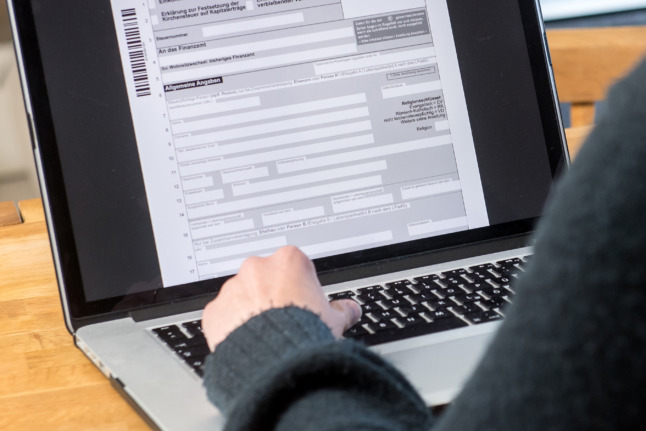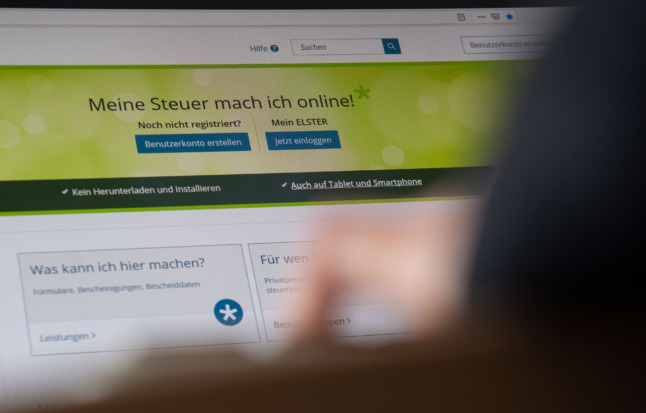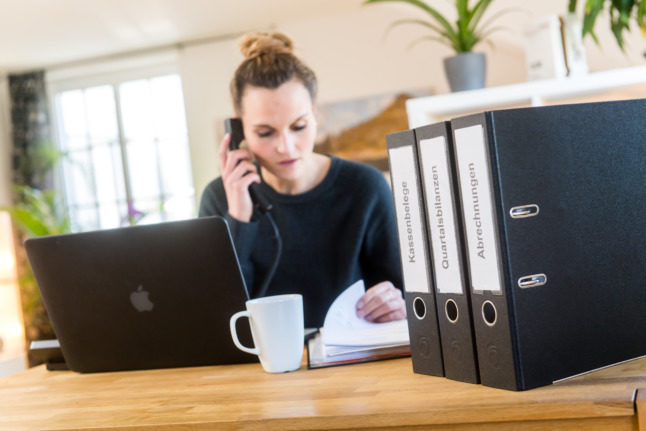The deadline for self-submitted tax returns may have been postponed this year due to Covid-19 (it’s now due on October 31st, in case you were wondering), but it’s always a good idea to clarify your tax situation as soon as possible.
If your business is a one-man or one-woman show, or you’re new to freelance life, you’re likely to be classed as a small business (or ‘Kleinunternehmer’), which means you can choose whether you want to charge VAT to your German clients.
Here’s a run-down of the so-called “small business rule”, when it applies, and the pros and cons of charging VAT to clients.
What is the ‘small business rule’?
As of 2021, anyone who earned less than €22,000 in the last tax year, and is on track to earn less than €50,000 this year can be classed as a small business owner. This means that charging VAT on top of your services to clients is optional.
READ ALSO: The tax terms that every expat in Germany needs to know
If you do decide to charge VAT, you can opt out the small business rule, but be aware that the decision you make sticks for five years – or until your circumstances change – so make sure you consider it carefully.
The pros and cons of charging VAT
If you don’t charge VAT to clients, it could help to make your services more competitive than larger firms. The current rate of VAT in Germany is 19 percent – a figure that can make a significant difference to your invoice, especially if your clients are also small businesses that can’t deduct VAT from their expenses.
Another major pro is that this type of freelancer has to fill in a lot less paperwork than larger companies. While larger businesses have to file monthly or quarterly VAT returns, those who fall under the small business rule simply have to file a tax return every year.
This makes it the far easier option for people who are new in Germany or otherwise nervous about the idea of filling in loads of German forms.
According to Martin Gundermann, founder of expat tax consulting service Intertax Consult, taking advantage of the small business rule can also have one or two disadvantages, depending on your situation.
READ ALSO: EXPLAINED: The rules and deadlines for filing German taxes in 2021
The first is that if you’re not charging VAT to clients, you’re also not able to deduct VAT from your expenses, so in years where you’re making major investments in your business or otherwise have big overheads, you could end up out of pocket.
“Businesses taking this option cannot claim VAT refundable on their expenses,” Gundermann tells The Local. “That means that the VAT they pay on their own business expenses is not refundable to them because they are small entrepreneurs.”

Using the small business rule could help minimise your paperwork, but some clients may prefer to work with larger firms. Photo: picture alliance/dpa/dpa-tmn | Benjamin Nolte
Lexware, a software company for small businesses, also suggest that classing your company as a ‘small business’ could be off-putting for some clients who would rather work with larger, more established firms.
In some cases, they may even consider dealing with smaller firms a riskier financial move.
“Potential customers shy away from doing business with companies with only very low sales, because they may go into bankruptcy more quickly and thus down-payments…can be lost,” Lexware explains.
Working for international clients
According to Gundermann, people who primarily deal with international clients are in a unique position with regard to this part of German tax law.
That’s because the amount you can earn to fall under the scope of the small business rule doesn’t include income from outside of Germany, so in theory, you could earn €100,000 a year from a client in the United Kingdom or Australia, but you only earn €10,000 from German clients, you’d still count as a ‘small business’ in the eyes of the tax office.
Of course, it’s up to you to work out if this really makes sense from a business or tax perspective, in light the above-mentioned pros and cons. A tax consultant or other type of financial advisor may able to help you further with your decision.
Registering and invoicing as a ‘small business’
Now for the really fun bit: putting all your new-found tax knowledge into practice.
If you’re starting a business this year – or any year – it’s essential to be transparent with the tax office from the start, says Gundermann.
“Upon starting a business in 2021 you must register at the local tax office,” he explained.
READ ALSO: What NOT to do when you’re freelancing in Germany
“On the registration form, you should tick the box that describes you as a “small entrepreneur” if you expect your revenues not to be more than €22.000 in 2021. Then you must issue an invoice without VAT to your clients and add a line in the invoice that states why you aren’t adding VAT.”
The line to add, in German, is “Keine Umsatzsteuer gem. § 19 UStG”, meaning “no VAT due to § 19 of the VAT law”.
Submitting your first tax return
If you’re filling in your own tax returns, the most common forms you’ll need on ELSTER (the official government portal for submitting your German tax return) are Est 1A 2020 (a general form), Anlage EÜR (for your profit/loss calculations) and Anlage Ust (for your VAT calculations).
Be aware, though, there are countless other forms for people with specific financial circumstances, such as investments, child-related expenses or alimony payments, so you may need to submit further forms if your situation is more complex.
Though you don’t collect VAT as a small business, it’s important to fill in the VAT form to clarify to the Finanzamt that you are under the threshold for German income and are therefore exempt from collecting that type of tax and paying it to the government.

If you’re filling in your tax return yourself, you can use the online portal ELSTER, or one of a number of expat tax form apps. Photo: picture alliance/dpa | Marijan Murat
If all of this sounds a bit too complicated, remember you don’t have to do it alone. For your first few tax returns, you can always enlist the help of a Steuerberater (tax consultant) to help you navigate the bureaucracy, with the added benefit that you’ll have a few extra months to submit your tax return if it’s done by a third party.
In addition, they should be able to offer you advice on your tax circumstances and the applicability of the small business rule.
If this sounds like overkill, there are also a number of English-language apps that have come onto the scene in recent years to help expats with their German tax returns. At around €30 or so, these services tend to be a fair bit cheaper than a tax consultant and are quick to do online at your own convenience.
READ ALSO: Five simple steps to getting your German tax refund
Aptly enough, services such as tax advisors to help you submit you tax returns are also – you guessed it – a tax-deductible expense. So they may not cost as much as you initially think.
Please keep in mind that this article, as with all of our guides, is to provide assistance only. It is not intended to take the place of official legal or financial advice.



 Please whitelist us to continue reading.
Please whitelist us to continue reading.
Member comments